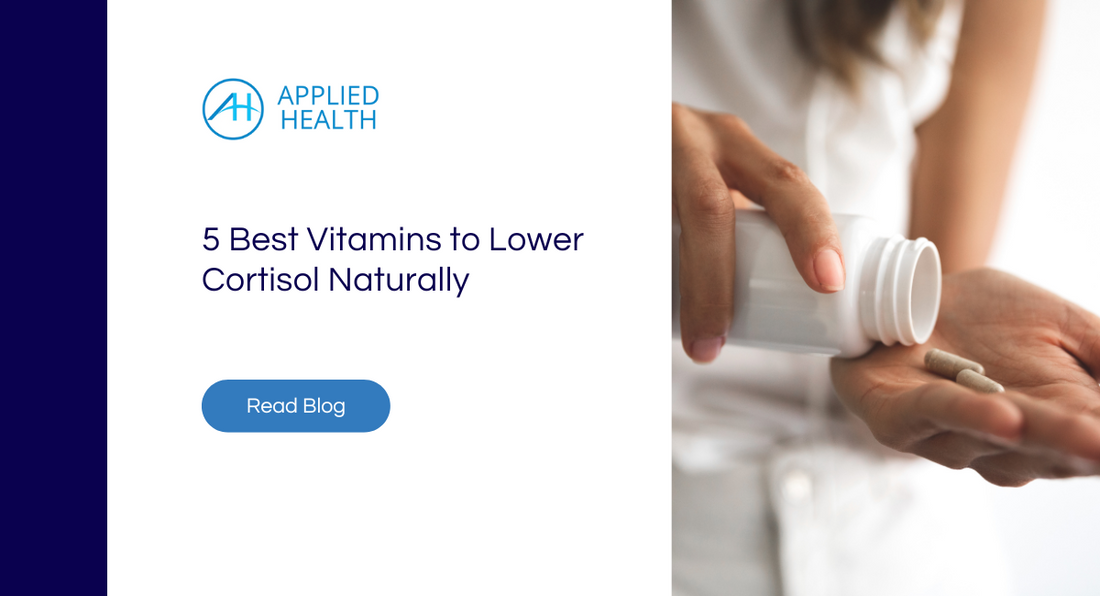Do you feel like stress is the background music of your life? Here's some good news. You can turn down the volume with specific vitamins to lower cortisol naturally.
With the sea of wellness tips flooding our lives, focusing on specific nutrients could be your first step towards a balanced state of mind and body.
Fortunately, certain vitamins to lower cortisol naturally have been supported by scientific studies. Let's explore what helps calm the mind through the hustle and bustle of stressful living.
Table Of Contents:
- How Cortisol Affects the Body and Mind
- The Best Vitamins to Lower Cortisol Levels
- More Ways to Support Healthy Cortisol
- Conclusion
How Cortisol Affects the Body and Mind
If you are juggling too much and on the verge of burnout from elevated stress levels, you are not alone. In today's fast-paced world, it is easy to let stress get the best of us.
But, did you know chronic stress can lead to elevated cortisol?
Cortisol is a hormone produced by the adrenal glands in response to stress. People often call cortisol the "stress hormone" because it helps you tackle stressful situations head-on and helps you cope.
Now, cortisol isn't always bad. Healthy cortisol levels can do wonders for keeping your brain sharp and focused. Plus, it gives your immune system a boost.
However, when cortisol levels are consistently too high, it can lead to serious health problems — including weight gain, high blood pressure, and mental health issues.
Symptoms of High Cortisol
So, how do you know if your cortisol levels are too high? Some common symptoms of high cortisol include:
- Weight gain, especially around the midsection.
- Fatigue and difficulty sleeping.
- Mood swings and irritability.
- Difficulty concentrating and memory problems.
- Muscle weakness and bone loss.
- High blood pressure and blood sugar imbalances.
If you're experiencing these symptoms, talk to your doctor. They can check your cortisol for you.
Health Risks Associated with Elevated Cortisol
If left unchecked, high cortisol levels can lead to serious health problems over time. Some of the health risks associated with elevated cortisol include:
- Osteoporosis and bone loss.
- High blood pressure and heart disease.
- Diabetes and insulin resistance.
- Cognitive decline and memory problems.
- Weakened immune system and increased risk of infections.
Fortunately, there are steps you can take to lower cortisol levels naturally.
The Best Vitamins to Lower Cortisol Levels
Let's look at natural ways to maintain healthy cortisol and relieve stress.
Ashwagandha
Ashwagandha is an adaptogenic herb used in Ayurvedic medicine. It's known for its ability to help the body adapt to stress and lower cortisol levels.
One study found that taking ashwagandha for 60 days lowered cortisol levels by 23%. That's a significant drop.
Interested in ashwagandha? Two premier wellness formulas — CortiControl and Sweet Serenity — contain ashwagandha and other nutrients to help manage stress and support healthy cortisol levels.
B Vitamins
B vitamins are a group of essential nutrients that play a key role in energy production, brain function, and stress management. They're also known for their ability to lower cortisol levels and improve mood.
One study found that taking a B-complex supplement for 12 weeks led to a significant decrease in cortisol levels and improved symptoms of stress and anxiety.
If you're interested in a B-complex supplement, look for bioavailable B vitamins that are easy to assimilate. Applied Health Complex B Vitamins contain the active forms of B vitamins your body needs to be easily absorbed in the body.
Magnesium
Magnesium is an essential mineral that plays a key role in over 300 biochemical reactions in the body. It's also known for its calming effects and ability to reduce stress.

Magnesium deficiency is linked to increased stress. And vice versa — meaning stress may lower magnesium levels, while low magnesium may increase stress.
You can add more magnesium-rich foods to your diet. Think leafy greens like spinach and Swiss chard, nuts and seeds, whole grains, and even dark chocolate (in moderation).
Omega-3 Fatty Acids
Omega-3 fatty acids are a type of healthy fat found in fish oil and certain plant foods. They're known for their anti-inflammatory properties and ability to support brain health. They can also help balance cortisol levels.
After eight weeks of omega-3 supplements, people saw their serum cortisol levels decrease. To find natural help for stress relief and bring down cortisol levels, toss more omega-3-rich foods into your meal.
The best sources? Fatty fish like salmon, sardines, and anchovies. If you're not a fan of seafood, fish oil supplements can be a great option.
Vitamin C
Vitamin C is a powerful antioxidant essential for immune function and skin health. But did you know it can also help decrease high cortisol levels?
Interestingly, research has shown that vitamin C can help lessen cortisol and make stress easier to handle. So, if you're looking for a simple way to maintain a healthy stress response, try adding more vitamin C-rich foods to your diet, like citrus fruits, berries, and bell peppers.
More Ways to Support Healthy Cortisol
Well, you're in for a treat if finding natural ways to keep stress at bay is on your agenda. Lifestyle changes, herbal remedies, and dietary modifications can also help you feel more relaxed and balanced.
Herbal Remedies
Some of the most effective herbs for reduced cortisol levels include:
- Rhodiola rosea, an adaptogenic herb that helps the body cope with stress.
- L-theanine, an amino acid found in green tea that promotes relaxation.
- Lemon balm, a calming herb that can help reduce anxiety and improve sleep.
Lifestyle Changes
Shaking up your daily routine with a few easy lifestyle tweaks can help take the edge off stress and lower those pesky high cortisol levels. Here are a few ideas to get you started:
- Practice relaxation techniques like deep breathing, meditation, or yoga.
- Get regular exercise, even if it's just a short walk around the block.
- Prioritize sleep and aim for 7-9 hours per night.
- Set boundaries and learn to say no to unnecessary commitments.
- Make time for hobbies and activities that bring you joy.
At first glance, these lifestyle tweaks might seem small, but trust me, they pack a powerful punch in dialing down your stress and boosting your overall happiness.
Dietary Modifications
Finally, make some simple changes to your diet to help manage stress and decrease cortisol levels. Here are a few tips:
- Eat a balanced diet rich in whole foods - like fruits, vegetables, whole grains, and lean protein.
- Limit your intake of processed foods, sugar, and caffeine.
- Incorporate stress-busting foods like fatty fish and nuts into your diet.
- Stay hydrated by drinking plenty of water throughout the day.
Managing stress and lowering cortisol levels doesn't have to be complicated. By making simple lifestyle changes, you can feel more relaxed, balanced, and in control of your health.
FAQs: Best Vitamins to Lower Cortisol
What is the best vitamin to reduce cortisol levels?
Magnesium, B vitamins, and ashwagandha top the charts for cortisol management to help manage stress better.
How can I lower my cortisol levels quickly?
Eat foods rich in omega-3s, vitamin C, and B vitamins, take CortiControl, practice deep breathing, and get restorative sleep with Sweet Serenity. These actions slash cortisol fast.
What vitamin is a cortisol blocker?
Vitamin C has been shown to help regulate cortisol and lowered cortisol levels that were too high after intense workouts.
Does magnesium lower cortisol?
Absolutely. Magnesium supplementation and magnesium-rich foods calm the body by keeping those pesky high-stress hormones in check.
Conclusion
No need for magic potions or quick fixes to dial back that stress and increased cortisol levels. Choosing the best vitamins to lower cortisol is a great way to find more resilience to the hustle and bustle.
A nutritious diet and vitamin supplementation reduce elevated cortisol hormones and help calm stressful lives. If you often turn to a quick fix from caffeine or sugar highs to boost energy levels, it only goes so far.
Mental well-being isn't about outrunning stress. It is about building resilience against it through a healthy diet and lifestyle changes.
We live in a fast-paced time where burnout looms large, and the need to regulate cortisol levels has never been greater. Give these suggestions a try to help find more balance and harmony.

